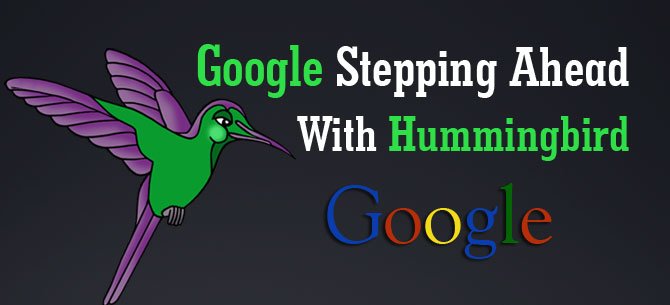Our Offices
USA OFFICE
937, Shore Point Court, # G313,
Alameda - 94501, California, USA.
INDIA OFFICE
C - 81C, Sector - 8,
Noida 201301, UP

 After Caffeine, Penguin and Panda updates, Hummingbird (which was launched a month ago) was officially announced On September 26, 2013. SVP at Google, Amit Singhal, announced a new algorithm, named as ‘Hummingbird’.
After Caffeine, Penguin and Panda updates, Hummingbird (which was launched a month ago) was officially announced On September 26, 2013. SVP at Google, Amit Singhal, announced a new algorithm, named as ‘Hummingbird’.
Hummingbird is another major change made to the Google’s algorithm after Caffeine. Caffeine update had revamped the search engine’s indexing infrastructure, and the latest rollout is expected to handle the long and complex queries efficiently by returning the best results to the web surfers. The update equips the search engine with the capability to understand the content and context of the documents it indexes. To be more precise, if someone is searching for “pay your bills through credit and debit cards”, the results used to bring up the home page of the credit and debit cards’ providers, but from now, the results would return with a specific page for paying bills.
Although the webmasters were fearful of the Panda and Penguin updates, but these updates were just modifications of the existing algorithm. This does not mean that the recent release has overwritten the previous updates. Instead, Google has introduced Hummingbird and replaced some of the traditional practices in the algorithm with the modern ones. Going into the details of Hummingbird, it indicates that the search engine has rebuilt the running formula to answer the complex questions in more informative and better way.
We all have noticed that Google is trying hard to provide better user experience on the web. Increase of internet usage has made queries more complicated, and keyword-based systems were struggling to satisfy the latest requirements. Retooling the algorithm is believed to match up the modern concept and meanings searched by the web users.
At the press conference at Menlo Park, Singhal told that “Hummingbird is the company’s effort to match the meaning of queries with the documents on the internet.”Google serves every two searches out of three in the USA, and handles even a larger volume of queries in some parts of Europe, and Asia. The official announcement has estimated to affect the 90% of the website searches. However, the launch has not received widespread complaints till the weekend. There is no news as such found on the web about the dipping ranking or traffic volume by the website owners.
Hummingbird, the name came from being ‘precise and fast’, is helpful for the ‘Conversational search’. Conversational search has a natural language and semantic search as well.
For example: If a user types in the search box, “Which is the nearest place to buy the iPhone?”Traditionally, the search might look for words matching “buy” and “iPhone”.
On the contrary, the new search activity focuses on the meaning behind the words. It understands the actual geographical location of the search (if the users have shared), and get the names of certain stores that carry the particular electronic devices. The new algorithm will help users to obtain a wonderful experience, besides getting pages with matching words. The goal is to find the pages matching the meaning of the words.
Subscription Implies Consent To Our privacy Policy
7 Reasons Why Internet Marketing Is Important For Your Business
The 10 Advantages of Using WordPress for Developing Business Website